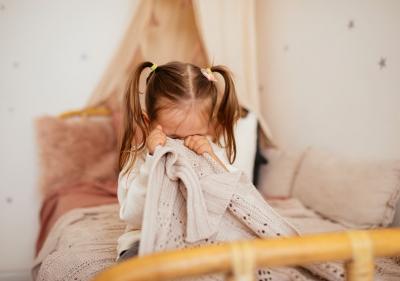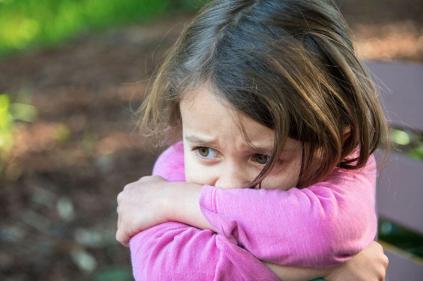My middle daughter and I are lying on our tummies on the floor of her bedroom. Outside, there is a storm brewing. From the floor, I can just see the clouds, blanched and turgid with rain. Our window pane shudders. Inside, we are building train tracks.
This close, in this light, Kitty is plump and golden as double cream. I can see the bluish tracery of veins running below her skin, the tawny glints in her button eyes. Her mouth is set, her expression implacable. This is her face.
Look at the storm, I say.
Her gaze is oblique as she looks up from the train set. Her eyes slide over me, catching my gaze, but never holding. Her expression flickers momentarily as she looks out the window, mouth softening.
It’s windy out there, she replies, and she hands me a wooden block.
Her eyes go down, mouth tautens with intent. You’re good at building, she mutters.
Every child is different.
But what do you do when your child is more different than others?
I didn’t really think that anything would come out of having Kitty see a psychologist. I know that Kitty is a funny little child. She’s odd. It’s one of the best things about her. She’s totally uncompromising, immovable in the face of any resistance. She’s tenacious to the point of being infuriating. She’s obsessed with routine. She has strange little tics, rituals that she has to observe, stock phrases that she has to use and reuse. She’s fascinating. But she’s also showing elevated markers for signs of ASD.
We’ve known for a while that Kitty needs additional support. Her glue ear was severe, the resulting speech delay was classified as a severe disorder (though is now being downgraded to mild). She has significant food aversions, a very limited diet. Other factors (difficulty in social situations, obsession with routine, lack of eye contact) raised enough concern that she was referred to a HSE psychologist. However, all of the red flags raised (and confirmed by the psychologist’s comprehensive range of tests) could very easily be explained away as part of the developmental delay caused by the hearing problems. Also, she’s four. There is a very, very wide range of normal for four-year-olds. We can only wait and see.
I’m not very good at loving people – I find it stressful. When I love people, I get cross and anxious at the thought of them being hurt. I still have anxiety dreams about needing to save my two younger sisters (both now fully grown, perfectly capable adults) from danger.
I’m not laid back and easy-going (in fact I’m probably quite difficult to love in return) – instead, I worry about things that haven’t happened yet, and am prone to melodrama and overreaction in the face of actual bad things happening. I’m not patient. I feel genuine, entrail-chilling despair at having to spend time in children’s playgrounds. I spend a lot of time doing the washing up, and very little time on messy craft activities.
But somehow, I’m very good at taking care of Kitty. I am her translator, her mediator, and her first line of defence. When she screams, I can tease meaning from her hysteria. Slow down, use words, breathe out.
I am oversensitive on her behalf – I bristle when strangers eavesdrop on our conversations - when I see them wondering how I can understand her. I intervene too readily when she plays with other children, desperate for them to include her (even though she never seems to mind when they don’t). During all the years of silence, when her actions seemed purely instinctive rather than considered, I wished that she would be able to find her words.
But in all this time, with all of the frustrations and the difficulties, I don’t ever think, why me? I do sometimes wonder why her – why life has to be that bit harder for such a small child. But there’s a simplicity to loving Kitty. We don’t love her for what we get back from her. There’s very little of the careless affectionate back and forth we have with our other children. We ask her for kisses, but most of the time we don’t get them. We provide comfort, and in return we receive trust. It’s pure and inexorable and natural, like the nudge and slide of the waves on the shore. We love her because we love her.
Breathe out.







